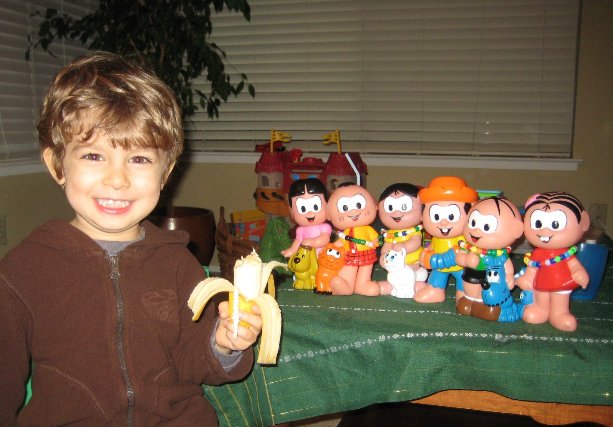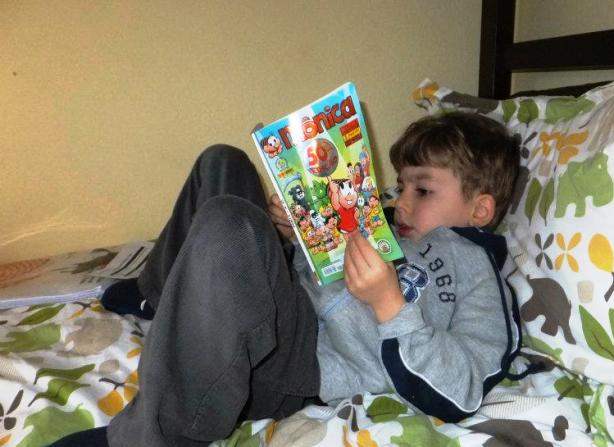Bring up teaching children to be bilingual and you are bound to hear something like “Little kids are just like sponges—they pick up languages so easily.” While it is true that the child’s brain is more capable of learning language than an adult’s and that they hold the special ability to learn a language as a native, it is actually quite difficult to raise a bilingual child. The reasons for this are that children are usually hesitant to actually speak one of the languages and will often drop the language in favor of the one that their peers speak. Also, while we adults know what a wonderful skill bilingualism is, children are not interested in having “skills.” Instead, they want what feels good and natural, so the main challenge is making the languages something that the child loves and won’t feel overwhelmed by having to deal with every day.
However, if you would like to raise a bilingual child, here are some tips based on linguistic research and my own experience raising two bilingual children.
Note: Normally when a child is bilingual, one language is dominant. This depends on many factors, especially where the child is living. I will refer to a “non-dominant language,” which means the language that the child receives less exposure to. Often the child does not receive equal input of the 2 languages. It is not, however, a “second language” because a second language refers to one learned after the first, whereas bilingual children normally learn the two languages simultaneously.
1) The most important factor in your child’s success is having a strong cultural connection to both languages.
Research in language acquisition has proven that a bilingual child has a cultural and emotional connection to both languages. A child who is being “taught” a language for which there is not a meaningful emotional connection will lose interest or rebel against the parents’ wishes. This is especially true when children start attending school and are surrounded by kids who don’t speak the non-dominant language.
One of the best ways to help your child’s language learning is to travel abroad and spend a good amount of time in the other country. My son understood Portuguese perfectly but did not start speaking until he had been in Brazil for 4 weeks when he was almost 3 years old. All of a sudden, it was like a floodgate was opened; the Portuguese just came pouring out, and he has been perfectly bilingual since.

2) Make the effort to strengthen the connection to the language.
To increase the cultural/emotional connection to the non-dominant language, immerse the child in the culture in fun and meaningful ways. Buy your child toys, books, clothes, etc. from that culture. Tell your child stories from the culture and of course in the language. If you are in a different country, make traveling to the other country as exciting and fun as possible.
For example, my husband made a special routine of Portuguese storytime every evening. At the same time, teach him or her to be proud of that culture. My son has about 40 comic books that feature from a Brazilian children’s show. These comic books serve as a way for my son to identify with the culture, humor, and language, and he absolutely loves it. He reads the comic books every day. My son’s favorite time of year is summer when we spend a month in Brazil.
3) Build strong, consistent language identities.
If you speak English but your spouse speaks Spanish, each of you must stick to that language with your child. Teach your child that your respective languages are part of who you are. My husband refuses to converse with my children in English and constantly talks to our kids about his culture. My older son is very aware of who in the family speaks which language because we hold fast to our language identities. Explain the situation to your family and friends so that they will not feel offended when you and your child are speaking in a language they might not understand.

4) You have to do what is natural for you.
Speak to your child in your first language. This allows you to express yourself from your heart and gives your child “native input,” which is important for your child’s own language learning. If you want your child to know Mandarin but are not a native speaker, speak to your child in your first language and find another way for your child to learn Mandarin.
5) Be sure both parents know both languages.
If you and your spouse speak different first languages, you may run into trouble if you don’t understand your spouse’s first language. For instance, when my husband and son are conversing in Portuguese, I understand them because I made the long but worthwhile effort of learning the language. I don’t think we could be a bilingual household if I weren’t able to understand so much of the family conversation.

6) Delays and language mix ups are normal and should not be “fixed.”
Children who are exposed to two languages often start speaking later, but the delay will sort itself out. Bilingual children will also have “language mix ups,” which are completely normal and expected. Probably the most common one is code switching, which refers to the use of a word from one language while speaking in the other language. You will probably notice your child forgetting words from one language and substituting those words from the other language. For instance, my son often forgets the word “tadpoles” in English and therefore might say, “Let’s go find some…umm…girinos.” Remember that every child and situation is different and that these issues are necessary growing pains of learning 2 languages at a young age.
7) Don’t correct your child’s speech.
Correcting children almost always backfires by making them frustrated or self-conscious. A child’s brain is so capable of language learning that no correction is needed. Mistakes are not really mistakes—they are a normal part of language acquisition, of the child’s making sense of the language rules and patterns, and interfering with that process actually does more harm than good. Keep in mind that children outgrow those “mistakes” by themselves.
8) Don’t feel the need to translate for your child.
Sometimes parents will say things first in one language and then the other thinking that they are helping the child understand. In fact, the analogy of the brain being a sponge is true because children quickly learn vocabulary in both languages. When they do not know a word, an explanation or description of the word can be much more effective than slipping into translation. Remember, the more native input of a language they get, the more they will understand and speak.
While raising a bilingual child isn’t an easy task, it is certainly worthwhile. Children benefit from the connections they can make with more people by speaking more than one language. As adults, they can benefit from being bilingual in the workplace. Possibly more important is the cognitive benefits of being bilingual that last throughout one’s lifetime. If you are thinking about raising your child to be bilingual, start early, from birth if possible.

Jenna runs the travel and lifestyle blog This Is My Happiness. She has an M.A. in linguistics and teaches English as a Second Language in California. She has a multicultural family spread out over 3 continents and loves culture, the arts, wine, and photography.
